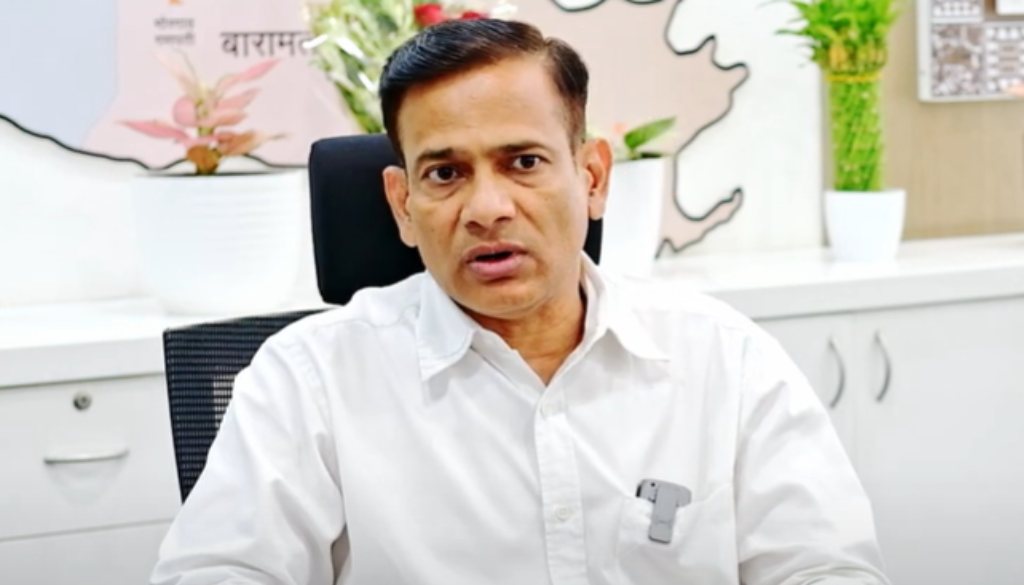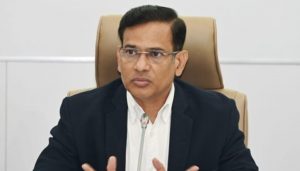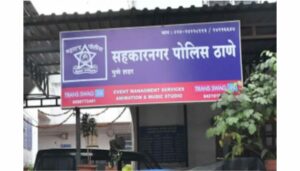Punekar News Exclusive: District Collector Dr Suhas Diwase Unveils Bold Strategy to Boost Voter Participation in Pune’s Lok Sabha Polls

Tikam Shekhawat & Varad Bhatkhande
Pune, 5th April 2024: The newly appointed District Collector of Pune Dr Suhas Diwase had an exclusive interview with Punekar News. Lok Sabha 2024 elections are approaching now with just 1 month for them to happen in the Pune district. in Baramati Lok Sabha constituency, voting will take place on 7th May 2024 while in Shirur, Pune and Maval Lok Sabha constituencies, voting will happen on 13th May.
District collector and District Election Officer Dr Diwase shared his insights on upcoming Lok Sabha elections exclusively with Punekar News. With just one month remaining until the elections commence in the Pune district, Dr Diwase expressed confidence, stating, “We are ready and well settled for the upcoming elections.”
Providing insights into the Pune District Lok Sabha elections, Dr Diwase highlighted the scale of the operation, stating, “Pune is among the largest districts in Maharashtra, hosting four parliamentary constituencies. Given its vast area, managing the district is quite challenging. We oversee more than 8,000 polling stations across the Pune district, covering 21 state assembly segments from Pune and three from Raigad district, totalling 24 assembly segments. To ensure smooth operations, we have designated four returning officers: myself for Pune, Additional Collector Ajay More for Shirur, Additional Divisional Commissioner Kavita Dwivedi for Baramati, and Additional Commissioner of PMRDA Deepak Singla for Maval. The voter count in Pune exceeds 8.3 million across all four constituencies and continues to rise.”
Emphasizing their efforts to increase voter participation, Dr Diwase mentioned, “In Pune district, we have undertaken extensive initiatives, particularly targeting marginalized groups such as women, transgender individuals, youth (first-time voters), industrial workers, and residents of both rural and urban areas with historically low voter turnout. Our efforts have significantly bolstered the voter registration numbers in Pune. Initially, our focus was on voter registration activities, and moving forward, we aim to enhance actual voter turnout. We conducted various activities in colleges, organized road shows, engaged with industrial and slum areas, and collaborated extensively with NGOs and students. Notably, we also conducted initiatives specifically tailored for the transgender community, resulting in over 750 transgender voters being registered in Pune district.”
Discussing the cVigil App aimed at ensuring fair and fearless elections, Dr Diwase remarked, “Active citizen participation is crucial for fair elections in Pune. While technology aids, it has limitations. Previously, reporting violations was challenging without a timestamped platform. The cVigil app allows instant reporting with evidence. We’ve handled over 225 complaints swiftly, directing them to our control room. Deploying 135 flying squads in shifts ensures prompt resolution within 100 minutes. Despite some unfounded complaints, we act swiftly. While rural challenges exist, we’re addressing them, and overall, feedback is positive.”
Addressing concerns regarding cash restrictions during elections, Dr Diwase clarified, “The purpose of having restrictions on cash is to prevent the misuse of money. The Election Commission of India (ECI) has given clear guidelines. Handling cash is not a problem. If you are caught with cash, you have to explain how you got this cash, from where have you withdrawn it, and what are you gonna do. Sometimes people carry cash and they may have emergencies, so you have to explain why you are carrying this cash. If you are carrying cash above 10 Lakh, the case goes to the Income Tax department. For us, we don’t wish to create problems for normal citizens. For elections, everyone from the excise, income tax department, police, and every authority in India is coordinating and sharing data. We are monitoring suspicious activities. For these transactions, you will have to be given explanations.”
When asked about managing over 8,000 polling stations and addressing the needs of elderly or vulnerable voters, Dr Diwase assured Punekar News, “We’re fortunate in terms of infrastructure, as the majority of our polling stations are located in government or school buildings. Following ECI guidelines, we’ve ensured all stations are on ground floors and equipped with basic amenities such as drinking water, lighting, electricity, toilets, ramps for the physically disabled, shelters, seating, and assistance for elderly voters, including wheelchairs. My team and I have personally inspected over 600 polling stations. For those aged 85 and above, the ECI has provided a home voting facility. We’ve contacted over 140,000 elderly voters to inquire about their preferences, and most of them are eager to cast their votes in person. We’ve established special teams to assist elderly and physically disabled voters, making their voting experience smooth and pleasant. This initiative by the ECI has been commendable.”
Regarding the biggest challenge he faces in the upcoming elections, Dr Diwase stated, “The scale is undoubtedly the biggest challenge, spanning from Panvel to Shirur. With 24 state assembly segments to manage, communication issues have arisen in approximately 39 polling stations. We’re employing runners and Amateur Radio Nets (Ham net) to address these challenges. Leveraging GIS technology has been instrumental in streamlining our operations.”
Highlighting his biggest strength as a District Election Officer, Dr Diwase emphasized, “My trained personnel are my biggest strength. We’ve conducted extensive training sessions for election staff across all segments, ensuring efficient planning and execution.”
When asked about his message for rural residents, Dr Diwase urged, “Rural communities are actively engaged in the electoral process, demonstrating a high level of awareness and participation. However, I’m concerned about the lower voter turnout in urban areas. Urban voters, despite being active on social media, need to translate their awareness into action by casting their votes. The Model Code of Conduct is deeply ingrained in rural areas, and if any violations are observed, I encourage the use of cVigil to report them. Additionally, I urge everyone to exercise their right to vote.”
Regarding the liquor policy during elections, Dr Diwase explained, “We’ve developed a comprehensive action plan to address the issue. In recent days, significant efforts have been made to curb illegal alcohol transportation and distribution. We’re rigorously enforcing our powers to prevent these illegal activities, including sealing illegal liquor establishments, with some cases reaching the High Bombay Court. Collaborative efforts between the police and excise departments have resulted in numerous actions and raids targeting the sale of liquor. Penalties have been imposed on pubs, restaurants, and liquor shops violating time limits.”





